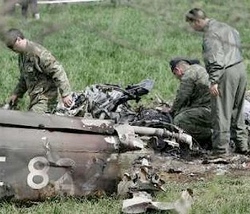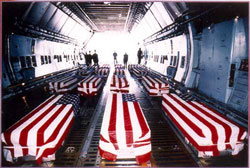 We learned Saturday that 30 American troops (along with seven Afghans) were killed Friday night when Afghan rebels shot their helicopter down during a raid. The obvious question: Why are U.S. troops still there?
We learned Saturday that 30 American troops (along with seven Afghans) were killed Friday night when Afghan rebels shot their helicopter down during a raid. The obvious question: Why are U.S. troops still there?
Afghanistan is no danger to the United States today, and it’s not our business to fix the country’s twisted political situation. I don’t see any evidence that it’s even realistically possible, especially considering that Afghanistan has a long history of humiliating invaders. Ask the British and the Russians about that.
So why are U.S. troops still fighting over this inhospitable piece of land where the people don’t like each other very much and like us even less? Many people would give many different justifications for the continuing war. (You do realize that it’s been going on for almost 10 years now, don’t you?) Some people would claim that if U.S. troops pulled out that terrorists would be able to go back to using the country as a safe haven. Others would say the U.S. needs to stay there to build a stable and democratic government. Others would be more honest and just say that since we started the fight, we have to gain a complete victory or else lose face.
All of the listed reasons are bogus. The real reason the U.S. military is still there is that war itself is good for the state, even though that’s not necessarily the conscious intent of the politicians making the decisions. In fact, many of them have spent their careers opposing U.S. involvement in wars, but when you reach a position of power — especially something such as the U.S. presidency — you frequently end up making decisions that reflect the permanent interests of the state.
There are a lot of things I wouldn’t agree with the early 20th century progressive writer Randolph Bourne about, but Bourne was among those on the left who broke from their fellow progressives (including John Dewey) who supported World War I as a way to spread democracy around the world. In an essay published after his death in 1918, Bourne explained why war is what makes the state so powerful:
“Wartime brings the ideal of the State out into very clear relief, and reveals attitudes and tendencies that were hidden. In times of peace the sense of the State flags in a republic that is not militarized. For war is essentially the health of the State. The ideal of the State is that within its territory its power and influence should be universal. As the Church is the medium for the spiritual salvation of man, so the State is thought of as the medium for his political salvation. Its idealism is a rich blood flowing to all the members of the body politic. And it is precisely in war that the urgency for union seems greatest, and the necessity for universality seems most unquestioned. The State is the organization of the herd to act offensively or defensively against another herd similarly organized. The more terrifying the occasion for defense, the closer will become the organization and the more coercive the influence upon each member of the herd. War sends the current of purpose and activity flowing down to the lowest level of the herd, and to its most remote branches. All the activities of society are linked together as fast as possible to this central purpose of making a military offensive or a military defense, and the State becomes what in peacetimes it has vainly struggled to become — the inexorable arbiter and determinant of men’s business and attitudes and opinions.”
War is what politicians use — consciously or unconsciously — to force people who live in the territory of the state to unite behind their rule. In times of peace, it’s easier for people to believe they don’t need the politicians and their control. But when people are afraid — as many in this country were after Sept. 11, 2001 — it’s easy to get people to go along with almost anything. (The various laws passed shortly thereafter which gutted many traditional protections of individual rights are perfect examples.)
You hear people mindlessly defending any war with the mantra that the military is “defending our freedom.” It frustrates me that people are willing to support pretty much anything done by the state as long as they’re told that it’s about “defending our freedom.” That’s simply a matter of allowing long-running propaganda (which starts in most schools, government or private) to override the ability to think. (As for “supporting the troops,” the best way to support them is to bring them home and let them get on with normal lives of supporting themselves as productive individuals instead of paying them to kill people in foreign lands.)
 Returning to the deaths of the troops in the U.S. helicopter Friday night, I do feel for the families of the men killed. I seriously do. But I’m frustrated that people are so callous about the lives of the completely innocent Afghan people who are being killed over there — because of the U.S. presence — and nobody makes a big deal about them. It seems to be a tragedy when Americans are killed, but when innocent Afghans die, that’s seen as “just part of war.” That is an obscene attitude.
Returning to the deaths of the troops in the U.S. helicopter Friday night, I do feel for the families of the men killed. I seriously do. But I’m frustrated that people are so callous about the lives of the completely innocent Afghan people who are being killed over there — because of the U.S. presence — and nobody makes a big deal about them. It seems to be a tragedy when Americans are killed, but when innocent Afghans die, that’s seen as “just part of war.” That is an obscene attitude.
What people don’t understand — and don’t want to understand — is that the U.S. government has gone around the world meddling for the last hundred years or so, and that’s created a lot of enemies. People don’t want anyone (whether Americans or anyone else) to come to their countries and force their will upon the locals.
The U.S. government has done vicious and ugly things in our name — and then lied to us about it, in many cases. It’s no wonder so many people around the world hate us. It doesn’t justify their murders of Americans, of course, but it’s easy to understand what created their anger. Whether it’s accidental killings by the U.S. military or intentional killing of wounded and unarmed people, if people from another country were in the United States doing that to our friends and family, we would be angry and eager to strike back. If the foreign power were too powerful to fight, we would turn to some kind on unconventional resistance. Why are we surprised that people in other countries don’t like having their friends and families killed for no reason, either?
It’s time for us to quit making new enemies. It’s time to pull the U.S. military back to the territory it’s supposed to defend — and leave the rest of the world alone until and unless that territory is attacked.
Note: If you’re interested in the ways that the United States has used misused its military over the last 50 years or so, I highly recommend, “Why We Fight,” a 2006 documentary. You can watch it online here.
 Wall Street protester accidentally illustrates power of voluntary action
Wall Street protester accidentally illustrates power of voluntary action Finding your own authentic voice is riskier than copying everybody else
Finding your own authentic voice is riskier than copying everybody else